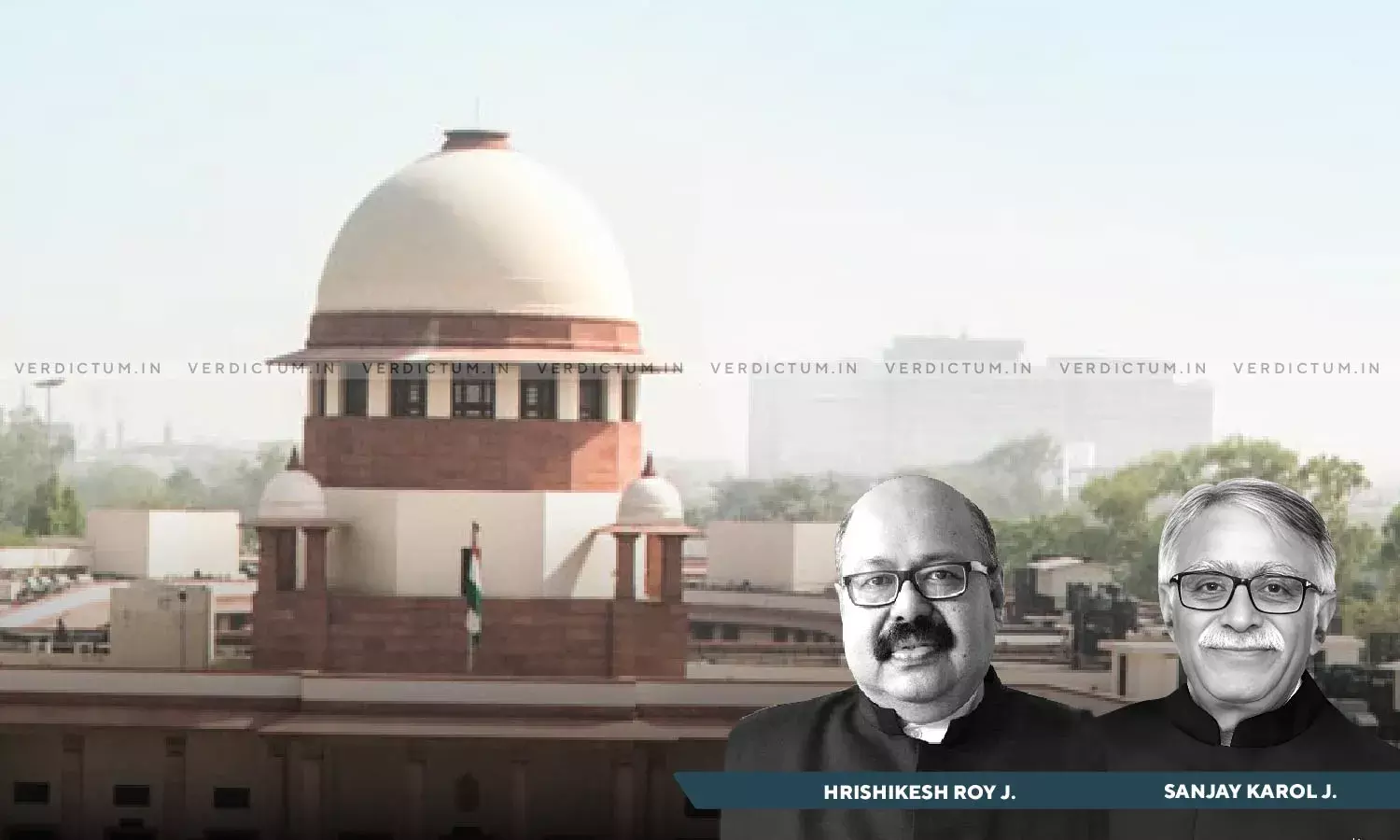Privileges Under Sections 22 & 23 Of Customs Act Regarding Abatement & Remission Extend Exclusively To ‘Importers’ Of Insured Goods: SC

The Supreme Court observed that the privileges enshrined in Sections 22 and 23 of the Customs Act, 1962, regarding abatement and remission extend exclusively to the ‘importers’ of the insured goods.
An insurance company had filed an appeal against the order of National Consumer Disputes Redressal Commission (NCDRC) which had partially allowed the consumer complaint.
The two-Judge Bench of Justice Hrishikesh Roy and Justice Sanjay Karol observed, “… the counsel for the claimant rightly contended that the privileges enshrined in Sections 22 and 23 of the Customs Act, pertaining to abetment and remission, extend exclusively to those classified as 'importers' of insured goods. The crux of the argument revolves around the claimant's distinct position, as the claimant neither assumes the role of importer nor owner; instead, they function solely as a custodian entrusted with the goods on behalf of their clients.”
The Bench said that the heart and soul of an insurance contract lies in the protection it accords to those who wish to be insured by it.
Advocate Aditya Kumar appeared for the appellants while Senior Advocates Parthiv K. Goswami and Mrinal Kumar Choudhury appeared for the respondent.
Brief Facts -
The respondent i.e., the claimant had purchased four insurance policies and it had leased the premises for warehousing purpose. The claimant paid Rs. 44,02,562/- to New India Assurance Co. Ltd. (Insurance company) for safeguarding the custom bonded goods and for covering the risk against fire, etc. During the pendency of such policies, a fire broke out at the insured warehouse and hence, Surveyors were appointed to assess the loss. The claimant/insured raised a claim of Rs. 6,57,55,155/- and on the day of the fire incident, the matter was reported to police which resulted in FIR.
The police investigation concluded an electrical short circuit as the cause, which was relayed to the Insurance Surveyor. On the other hand, the Forensic Examined highlighted that welding work on the roof was a possible cause. However, the Investigator appointed by the insurance company contracted the Forensic Examiner’s findings. Hence, a consumer complaint was filed. The NCDRC ruled in favour of the claimant finding deficiency in service of the insurance company. It directed the insurance company to pay Rs. 6,57,55,155/- for a fire insurance claim with 9% interest from claim denial date within 8 weeks, or face 12% interest beyond the stipulated 8 weeks.
The Supreme Court in view of the facts and circumstances of the case noted, “The surveyor’s report cannot be considered a sacred document and contrary evidence, including an investigation report, is subject to rebuttal. The key question is whether the investigation report is indispensable, or if the survey report alone is sufficient, to determine the cause of the fire.”
The Court said that multiple survey reports suggesting different causes of fire present a perplexing conundrum on the insurance claim and that the reports provided by the insurer, though submitted with intent, were found to be inconclusive and contradictory.
“The reports furnished by the claimant, which include assessments by government departments and two independent surveyors, have however consistently identified the cause of the fire as a short-circuit. While it is difficult to go by the reports relied upon by the insurance company, the reports furnished by the claimants being consistent and logical are more acceptable in ascertaining the true cause of the fire”, further noted the Court.
The Court also said that in this case, no bills of entry were filed and no assessed goods were lost in the fire.
“… the reports suggesting electrical short circuit as the trigger for the warehouse fire, is found to fit in with the attendant circumstances. As a corollary, the fire at the warehouse cannot be attributable to any negligent act of the insured. Moreover, the fire is found to have occurred within the insured warehouse and the appellant’s plea to the contrary, is not believable. Therefore, it is a case of wrongful repudiation by the appellants. No legal infirmity is thus seen with the impugned decision favouring the respondent’s insurance claim”, observed the Court.
Furthermore, the Court said that, trust serves as the cornerstone, forming the essence of the insurer-insured relationship and the fundamental principle is that the insurance is governed by the doctrine of uberrimae fidei i.e., there must be complete good faith on the part of the insured.
“In the realm of risk and uncertainty, individuals and organisations seek solace in the bastion of insurance – a covenant forged on the bedrock of trust. … insurance accords protection & indemnification, preserving the sanctity of trust within its clauses. Effectively, the insurer assumes a fiduciary duty to act in good faith and honour their commitment. This responsibility becomes particularly pronounced when the insured, in their actions, have not been negligent. In light of the vital role that trust plays in insurance contracts, it is important to ensure that the insurer adequately fulfils the duty that has been cast on it, by virtue of such a covenant”, concluded the Court.
Accordingly, the Apex Court dismissed the appeal.
Cause Title- New India Assurance Co. Ltd. & Ors. v. M/s. Mudit Roadways (Neutral Citation: 2023 INSC 1022)


